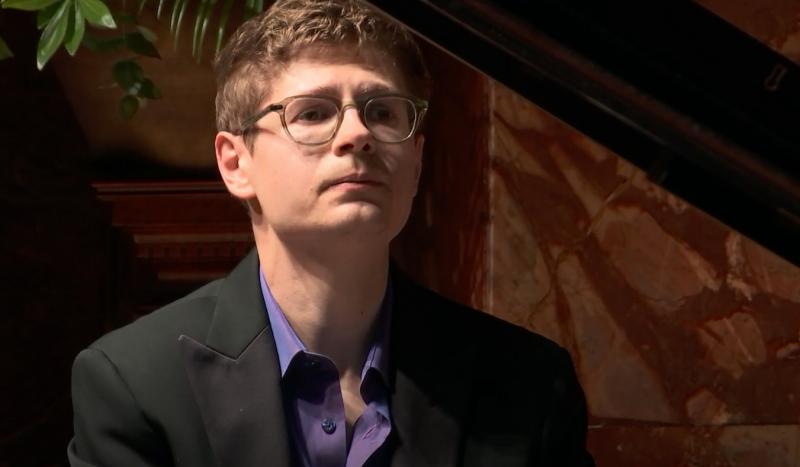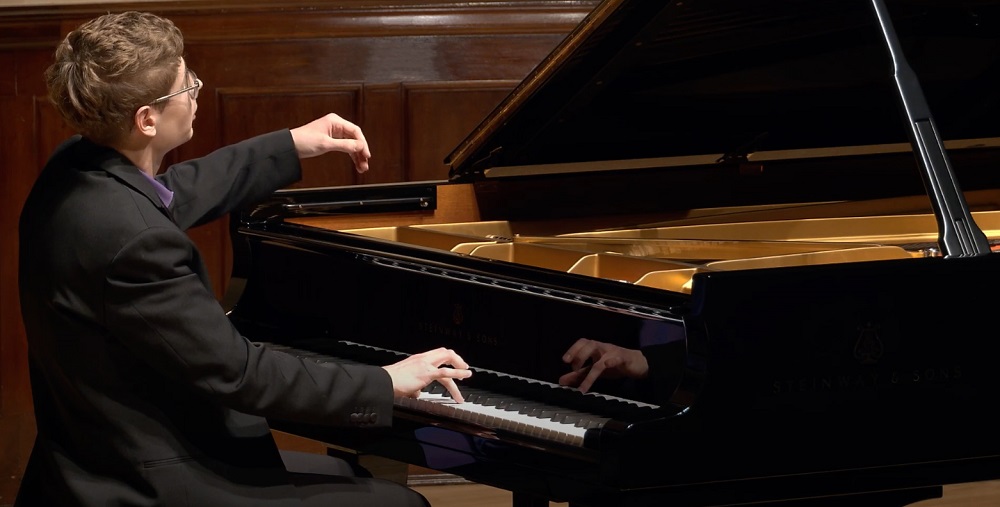Pavel Kolesnikov, Wigmore Hall review - the stuff of dreams | reviews, news & interviews
Pavel Kolesnikov, Wigmore Hall review - the stuff of dreams
Pavel Kolesnikov, Wigmore Hall review - the stuff of dreams
A breathtaking recital from the Russian pianist, plus a special prize

To plan a programme around The Tempest, its symbolism and the idea of evanescence, the fragility of the human condition, is one thing. To pull it off convincingly is quite another. The young Russian pianist Pavel Kolesnikov not only did so in his Wigmore Hall recital on Monday night, but offered an evening so profoundly touching that it seemed at times to inhabit Prospero’s magic island, plus some.
Music, as many have commented over the centuries, lives in the spaces between the notes; and here, however many (Liszt) or few (Schubert) were available to play, Kolesnikov carried its message to us through subtler means. Something about these streamed and socially-distanced concerts in the pandemic has pushed the communicative nature of musical performance to special levels of urgency. And Kolesnikov’s extraordinary sensitivity already seems to be reaching new stratospheres.
This was no ordinary recital, even though its components were in themselves not so strange. On paper the pieces nevertheless looked startlingly juxtaposed: the interpersing of Liszt and Skryabin, (two short pieces from Scriabin’s Quatre Morceaux Op. 51 plus his Sonata No. 2, and two Liszt Transcendental Etudes with a miniature to match), the Schubert Moments Musicaux, and Beethoven’s D minor Sonata Op. 31 No. 2, nicknamed “The Tempest” for reasons best known to his discredited sometime-secretary Anton Schindler. Most pianists would place this composer first in the programme; Kolesnikov made him the culmination.  The connections between the works were emotional more than historical, unfurling in a long span in which Kolesnikov only took one brief break, before the Beethoven. They relied not only on similarities, but sometimes upon extreme contrast: here were works that could take one’s breath away with their technical ambition – Liszt’s “Wilde Jagd” and “Vision” – set alongside some that make their point with the minimum of notes and the darkest of outlooks – the Schubert. Scriabin whirled in with winds of change, ambiguity, doubt and fantasy; and the Beethoven in Kolesnikov’s hands became musical philosophy as much as poetry, its concepts connected ineffably to The Tempest’s spirits of air and earth, wisdom and longing. Perhaps Schindler was right about some things after all.
The connections between the works were emotional more than historical, unfurling in a long span in which Kolesnikov only took one brief break, before the Beethoven. They relied not only on similarities, but sometimes upon extreme contrast: here were works that could take one’s breath away with their technical ambition – Liszt’s “Wilde Jagd” and “Vision” – set alongside some that make their point with the minimum of notes and the darkest of outlooks – the Schubert. Scriabin whirled in with winds of change, ambiguity, doubt and fantasy; and the Beethoven in Kolesnikov’s hands became musical philosophy as much as poetry, its concepts connected ineffably to The Tempest’s spirits of air and earth, wisdom and longing. Perhaps Schindler was right about some things after all.
Kolesnikov, who’s 31, seems an old head on young shoulders, and not above acknowledging a “thing of darkness” his own. Like Prospero, he’s in full command of a magnificent range of powers, whether it is the ability to pace a long crescendo in the Liszt, to sustain the lengthy hypnotic atmospheres of Schubert, to judge wisely the tempi of the Beethoven (some people play it way too fast; thank goodness, he doesn’t), or to let fly the marvels of Liszt and Scriabin with all their weird and wild imaginings. Ultimately there’s little point praising his gorgeous sound quality, his ability to colour each composer’s character in a different way, or his sober, undaunted poise in the Transcendental Etudes, because this artistry takes these things as a given; they are simply springboards into another plane of existence. This is such stuff as musical dreams are made on.
The arrival of a critic on stage after the Beethoven could only mean one thing: a prize. Sure enough, Guy Rickards was there to present Kolesnikov with the UK Critics’ Circle Music Section’s Emerging Artist Award for 2019, the pandemic having made earlier delivery impossible. The pianist made a gracious acceptance speech, emphasising how interdependent artists and audiences are. “We need each other,” he noted – and ended the evening with a gentle, shadowy account of Chopin’s "Raindrop" Prelude, which said it all.
rating
Explore topics
Share this article
The future of Arts Journalism
You can stop theartsdesk.com closing!
We urgently need financing to survive. Our fundraising drive has thus far raised £49,000 but we need to reach £100,000 or we will be forced to close. Please contribute here: https://gofund.me/c3f6033d
And if you can forward this information to anyone who might assist, we’d be grateful.

Subscribe to theartsdesk.com
Thank you for continuing to read our work on theartsdesk.com. For unlimited access to every article in its entirety, including our archive of more than 15,000 pieces, we're asking for £5 per month or £40 per year. We feel it's a very good deal, and hope you do too.
To take a subscription now simply click here.
And if you're looking for that extra gift for a friend or family member, why not treat them to a theartsdesk.com gift subscription?
more Classical music
 Robin Holloway: Music's Odyssey review - lessons in composition
Broad and idiosyncratic survey of classical music is insightful but slightly indigestible
Robin Holloway: Music's Odyssey review - lessons in composition
Broad and idiosyncratic survey of classical music is insightful but slightly indigestible
 Classical CDs: Wolf-pelts, clowns and social realism
British ballet scores, 19th century cello works and contemporary piano etudes
Classical CDs: Wolf-pelts, clowns and social realism
British ballet scores, 19th century cello works and contemporary piano etudes
 Bizet in 150th anniversary year: rich and rare French offerings from Palazzetto Bru Zane
Specialists in French romantic music unveil a treasure trove both live and on disc
Bizet in 150th anniversary year: rich and rare French offerings from Palazzetto Bru Zane
Specialists in French romantic music unveil a treasure trove both live and on disc
 Scottish Chamber Orchestra, Ibragimova, Queen’s Hall, Edinburgh review - rarities, novelties and drumrolls
A pity the SCO didn't pick a better showcase for a shining guest artist
Scottish Chamber Orchestra, Ibragimova, Queen’s Hall, Edinburgh review - rarities, novelties and drumrolls
A pity the SCO didn't pick a better showcase for a shining guest artist
 Kilsby, Parkes, Sinfonia of London, Wilson, Barbican review - string things zing and sing in expert hands
British masterpieces for strings plus other-worldly tenor and horn - and a muscular rarity
Kilsby, Parkes, Sinfonia of London, Wilson, Barbican review - string things zing and sing in expert hands
British masterpieces for strings plus other-worldly tenor and horn - and a muscular rarity
 From Historical to Hip-Hop, Classically Black Music Festival, Kings Place review - a cluster of impressive stars for the future
From quasi-Mozartian elegance to the gritty humour of a kitchen inspection
From Historical to Hip-Hop, Classically Black Music Festival, Kings Place review - a cluster of impressive stars for the future
From quasi-Mozartian elegance to the gritty humour of a kitchen inspection
 Shibe, LSO, Adès, Barbican review - gaudy and glorious new music alongside serene Sibelius
Adès’s passion makes persuasive case for the music he loves, both new and old
Shibe, LSO, Adès, Barbican review - gaudy and glorious new music alongside serene Sibelius
Adès’s passion makes persuasive case for the music he loves, both new and old
 Anja Mittermüller, Richard Fu, Wigmore Hall review - a glorious hall debut
The Austrian mezzo shines - at the age of 22
Anja Mittermüller, Richard Fu, Wigmore Hall review - a glorious hall debut
The Austrian mezzo shines - at the age of 22
 First Person: clarinettist Oliver Pashley on the new horizons of The Hermes Experiment's latest album
Compositions by members of this unusual quartet feature for the first time
First Person: clarinettist Oliver Pashley on the new horizons of The Hermes Experiment's latest album
Compositions by members of this unusual quartet feature for the first time
 Gesualdo Passione, Les Arts Florissants, Amala Dior Company, Barbican review - inspired collaboration excavates the music's humanity
At times it was like watching an anarchic religious procession
Gesualdo Passione, Les Arts Florissants, Amala Dior Company, Barbican review - inspired collaboration excavates the music's humanity
At times it was like watching an anarchic religious procession
 Classical CDs: Camels, concrete and cabaret
An influential American composer's 90th birthday box, plus British piano concertos and a father-and-son duo
Classical CDs: Camels, concrete and cabaret
An influential American composer's 90th birthday box, plus British piano concertos and a father-and-son duo
 Cockerham, Manchester Camerata, Sheen, Martin Harris Centre, Manchester review - re-enacting the dawn of modernism
Two UK premieres added to three miniatures from a seminal event of January 1914
Cockerham, Manchester Camerata, Sheen, Martin Harris Centre, Manchester review - re-enacting the dawn of modernism
Two UK premieres added to three miniatures from a seminal event of January 1914

Add comment